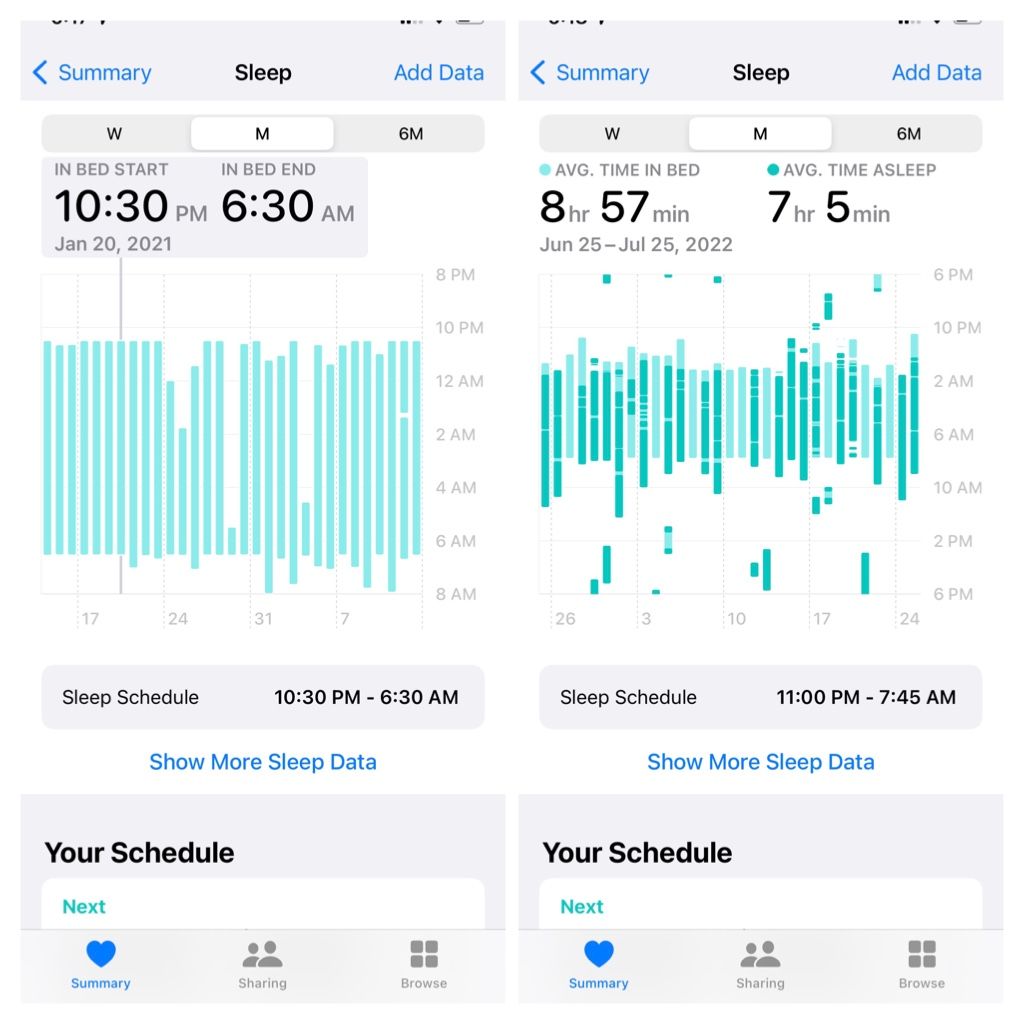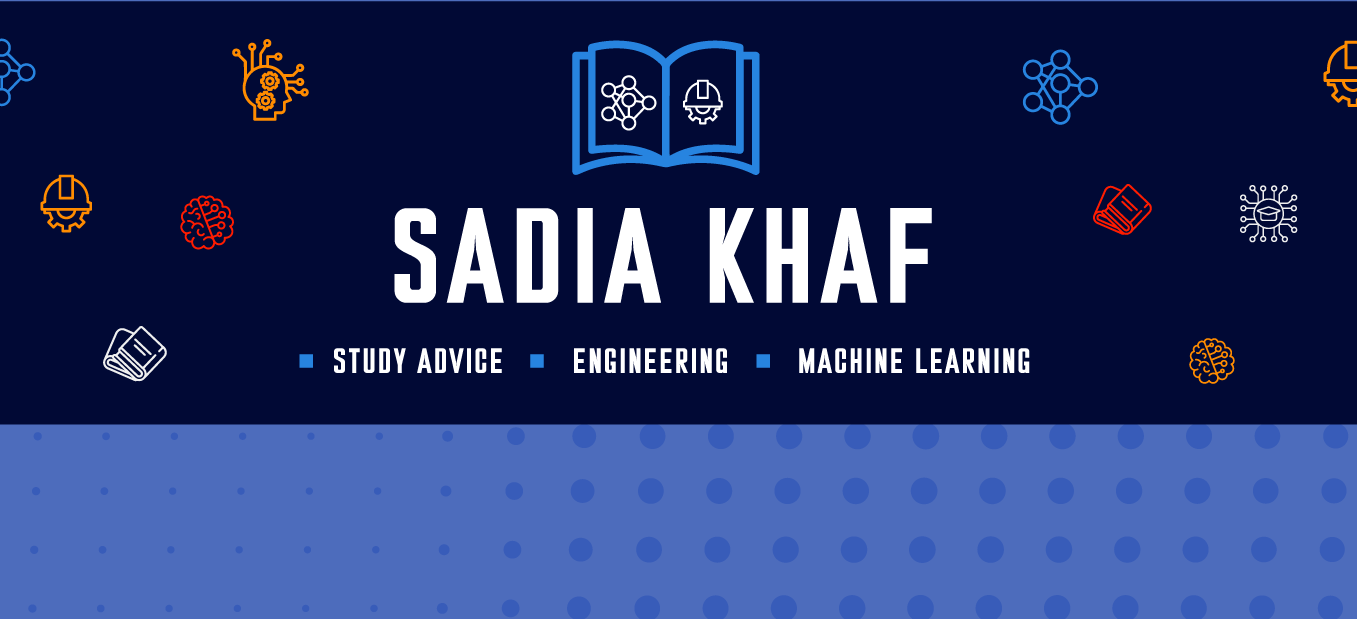🛌 Between January 2020 and July 2021, my sleep schedule looked something like the left side of the following picture. I consistently went to bed by 10:30 and woke up at 6:30 sharp, jumped out of bed, went for a morning run, followed by shower and breakfast. I had high levels of energy throughout the day. I routinely ate healthy foods, and made generally healthy lifestyle choices in everything from health to education, finance, and personal development. However, if you look at my more recent sleep graphs in the right picture, I have no consistent sleep schedule. I gained 22 pounds weight, throwing me onto the edge of overweight category. My cardio fitness took a nose dive. My consumption of pizza and pasta sky rocketed and let’s not even talk about my Ph.D. studies.

⁉️ So what went wrong, and what am I going to do to fix it?
🎯 It would be very easy for me to blame it all on getting married. I could avoid feeling guilty about it by blaming it on my husband’s sleep schedule, him being the cook in our household, and not having enough time for workouts because I’m waking up late when he wakes up. BUT, then I would have no way to improve my health and diet, no way to get back on my feet regarding my studies, and no way to get my cardio fitness back up. So instead, I’m choosing to take personal responsibility. Also I just re-read the book “The 5AM club” in the form of short form summaries on Blinkist so I’m feeling extra motivated right now. So much so that I went ahead and changed my sleep schedule on my phone to wake up at 7am, and booked my gym appointment for the next two days. I’m planning to make it all the way to waking up at 6:00am sharp every day again, but gradual changes in sleep routines are easier to bring about than a one day change.
🚀 The Book in 3 Sentences
- Getting up at 5AM gives you self discipline, isolation, and a space that boosts creativity, growth, and self development.
- Waking up before everybody else gives you a freedom from distractions, which is essential both for creativity and peaceful reflections.
- It makes you focused and sets you up for success.
🎨 Impressions
The book sounds actionable. There are some points that I disagree with but the general idea of the book can be applied to anybody’s life in a modified form.
🔎 How I Discovered It
It was in my face everywhere, I first got to know about it from my friend Kuljeet and read it. But the latest listening happened when Blinkist suggested it.
🤓 Who Should Read It?
Anyone interested in trying a big change in life and improving their health, spirituality, and creativity.
☘️ How the Book Changed Me
- I am reconsidering waking up early after listening to the Blinkist version of the book.
- I am reconsidering having a consistent morning workout routine.
- Daily morning cold-ish showers used to bring me joy. I should restart that routine.
✍️ My Top Objections
- The author’s suggested 10pm - 5am schedule does not meet the required 8 hours of healthy sleep schedule. We know from “Why we sleep” by Mathew Walker that less than 8 hours of sleep can have long lasting devastating effects of health and wellbeing.
- In summer, sleeping by 10pm is nearly impossible in Canada because the sunset is after 9pm, and the daylight keeps giving us the illusion that it’s not time to sleep yet.
- The author suggests stop using any technology and blue light by 8pm. This does not leave enough room for any social interactions, movie nights, or even generally inviting friends over for dinner since most people finish work at 6-6:30 in Canada.
- The author is obviously male, and did not anticipate a woman's need for 20 minutes of hair drying after shower in his 20-20-20 rule.
📒 Summary + Notes
A billionaire gives life advice to an artist and an entrepreneur about waking up everyday at 5am and using the first 2.7 hours of every single day on personal development for 10 years straight to master anything.
⏰ The 20-20-20 Rule
How to use the first hour of the day most effectively in the form of a morning routine?
- 20 min to Move: sweat, vigorous exercise, sweat as much as possible for 20 minutes
- 20 min to Reflect: deep peace and solitude, isolation, visions of silence, journal, write your ambitions, visions, frustrations, meditate (lowers cortisol and reduces stress).
- 20 min to Grow: Learn, read biographies, documentaries, audiobooks about learning.
Stop using technology by 8pm. Spend the last two hours of the day with your loved ones. Go to bed no later than 10pm.
Jump out of bed at the first ring of the alarm clock before your brain has had a chance to make excuses. And start moving right away.
Deep sleep is equally important.
Incorporate periods of rest and relaxation in your work.
❤My Favourite Things
🐭 The Mouse Every Student Needs:
I just bought a Logitech Mx Master 3S, and it is everything that my lifelong favourite Mx Master 3 had, but better. It is quieter and for some reason feels more premium. I gifted the last version to my best friend and he loves it. You can do the whole shebang of customizing the keys, and middle scroll, and scroll lock, but in your procrastinating mode, you can just play with the scroll wheel and it feels better than a fidget spinner.
🎬YouTube Video:
If you are a student planning to apply for higher education, but don’t have any research papers, you should definitely watch my latest video about “How to show OUTSTANDING research potential in CV without Publications”.
I see that you’ve made it to the end. If you liked this blogpost, check out the other stuff I talk about on my YouTube Channel. Don’t forget to subscribe!😉

